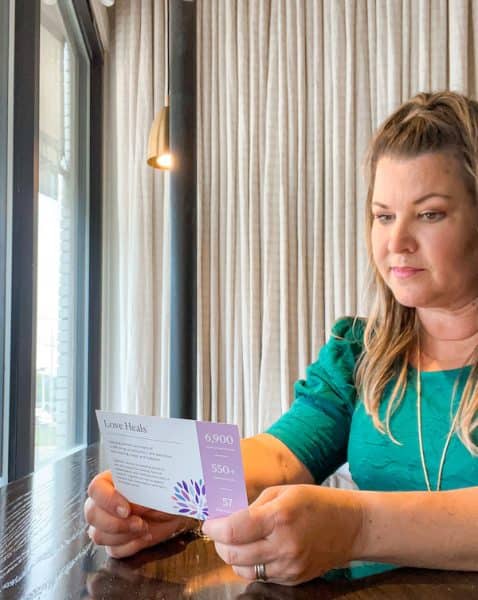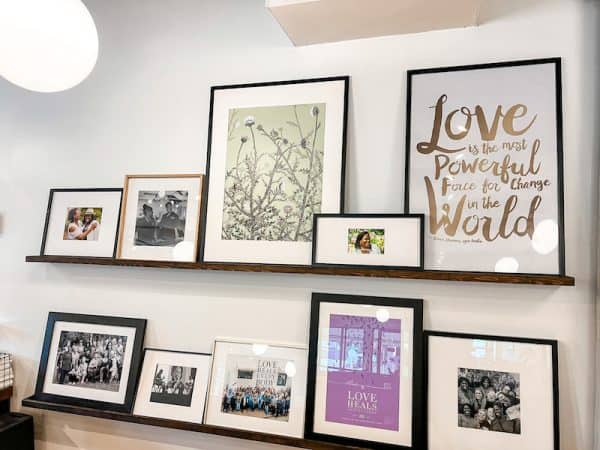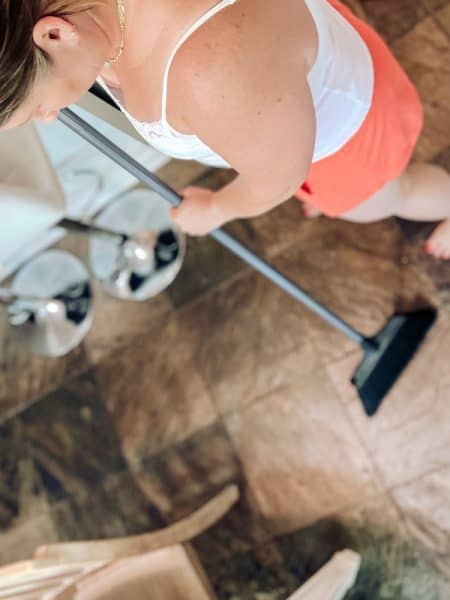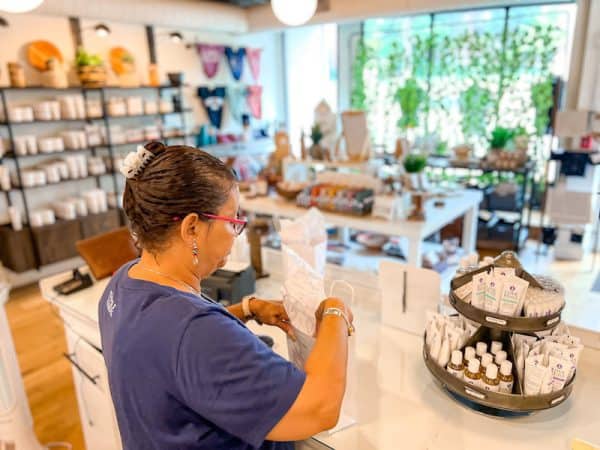This post may contain affiliate links, which means we may receive a small commission when you make a purchase at NO additional cost to you. Thank you for supporting our site in this way!
I’ve partnered with Polaris to raise awareness of human trafficking and share my personal insights on such an extremely important, yet often misunderstood, conversation.
My family moved to Nashville from Florida twelve years ago. Because we still had so much family down South, we frequently made the 13-hour road trip back to visit grandmas, cousins, and, if I’m being completely honest, Mickey & Minnie.
No road trip with two small children is complete without several stops along the way. We’d pull off at highway rest areas, Turnpike Service Plazas, or state welcome centers to save time if we just needed a quick restroom break.
If you’ve ever done the same, then you know that cars pull into one side of the building, while trucks are directed to the opposite side. On one such trip, I took my two children into the women’s restroom. While I typically rush us all through the process, something in my spirit made me pause on this particular trip.
I noticed a woman at the far end of the sinks washing more than just her hands. Her clothes were mismatched and, frankly, looked like they had been bought in one of the service plaza gift shops.
While it’s not uncommon to find people brushing their teeth, applying makeup, or even washing stains out of their clothing in places like this, something seemed off. I desperately wanted to reach out to her, but I didn’t know how. At the same time, I worried about simultaneously offending her and alarming my children in the process.
I opted not to say anything in the moment.
However, as I left the restroom, I lingered outside longer than I normally would. In the past, I’ve noticed posters directing people on how to contact authorities if they suspected anything troublesome. But I couldn’t find any such materials at that location.
By this point, my kids wondered why we weren’t leaving yet. I told them I was worried about a woman I saw and I wanted to make sure she wasn’t alone. They busied themselves in the corridor until I finally saw her leave the restroom. Instead of heading in our direction towards the cars, I noticed she turned right toward the truck entrance.
This only heightened my worry that she might somehow be involved in human trafficking.
I’ll spare you the rest of my mental conundrums and skip to the end: instead of approaching her directly, I found a worker at the information booth and expressed my concern. She then contacted a security patrol officer who offered to check out the situation.

I’m sorry to say I don’t have a neat and clean ending to my story. I did the best I could with the information and resources I had at the moment. But I wasn’t comfortable with the inner turmoil I was wrestling with. I wondered whether I did enough in the situation while balancing not wanting to offend the woman if I had approached her directly.
I realized I needed a better answer moving forward. Education had to be a part of that solution, but I also had to do more.
How to Become a Better Advocate
Since that time, I’ve come up with a few ways to become a better advocate. I purposed to:
- Educate Myself & Report Concerns
- Connect in My Community
- Use What I Have to Help
Before I get into how we can all help solve the human trafficking crisis, let’s start by redefining human trafficking.

As I mentioned in my personal account above, I struggled with recognizing whether the woman in question was in fact involved in human trafficking. One of the keys to partnership is learning the story behind the situation rather than just the signs. At the time, my definition of human trafficking was limited to sex trafficking.
In reality, experts believe there are more situations of labor trafficking than sex trafficking. The perception in the US seems to be skewed. Among Americans, there is a much wider awareness of sex trafficking than of labor trafficking.

Human Trafficking Definition
According to Polaris, human trafficking is “the use of force, fraud or coercion to get another person to provide labor or commercial sex.” Some examples include online trawling, survival sex, familial trafficking, and even exploitation of addiction or disabilities. These are not the only ways sex trafficking occurs, but some of the most frequently heard on the U.S. National Human Trafficking Hotline.
Other misconceptions of human trafficking include that victims are often coerced by strangers. The truth we’ve learned from survivors is that many were trafficked by people they knew, including romantic partners, spouses, and family members. Sadly, this category includes parents as well.
Even labor trafficking has many iterations. It can include any or all of the following:
- Domestic work in marriage
- Migrants, immigrants, and domestic work
- Exploitation of disabilities
- Exploitation of addiction
- Fraudulent job offers
While every situation is unique, traffickers tend to follow patterns. Force, fraud, or coercion MUST be present for a situation to be trafficking and that force, fraud or coercion MUST be the factor that compels the person to remain in the situation. The one major exception to this rule pertains to children: anyone under the age of 18 who is having sex for money or for something of value is considered a victim of trafficking.

Because of how trafficking works, most people do not identify their experience as trafficking until AFTER the situation is over. Now that we’ve broken down some of the myths and misconceptions about human trafficking, let’s look at how to help put an end to it.
3 Ways to Help Stop Human Trafficking
Here are 3 ways I’ve learned to help stop human trafficking today:
1. Educate Yourself Before Reporting Concerns
Just by reading this article, you’re taking the first step to learning more about the reality of human trafficking. Before we can take action, it’s important to learn how trafficking really works.
Once you learn what human trafficking is, you will be in a better position to report trafficking when you do find someone in your life in that situation.
The key to being able to help is having some degree of context and proximity to the situation. Beyond just learning and recognizing the signs of human trafficking, we need to dig into the circumstances that lead to trafficking.
This means both gaining a better understanding of who victims are (and the circumstances that make them vulnerable), as well as how traffickers operate and exploit their victims. You likely won’t be able to identify that someone is experiencing human trafficking simply from a passing glance across the room. The same applies to my short encounter with seeing someone in a gas station restroom.
By focusing on gaining a better understanding of human trafficking, we will be better able to identify it in situations where have achieved closeness and greater familiarity.
To report anything suspicious, contact the National Human Trafficking Hotline, operated by Polaris, at 888.373.7888 or text “help” to BeFree (233733).
When we heighten our vocabulary and awareness around the subject of trafficking, we become more in tune when injustice occurs. But don’t stop there. In my opinion, connection is the next key.
2. Connect in Your Community
Beyond learning about the relationships involved in trafficking, it’s important to learn about and volunteer with local communities that support and serve victims and provide resources for human trafficking survivors.
Think about it, being in community with survivors and those who work with them closely will help you become better aware and understanding of their stories and signs. If and when we come across a potential trafficking situation, it helps to be able to refer from first-hand experience rather than just handing someone a phone number.
Creating community can take on a variety of shapes and forms. It may look like working to address homelessness. It can come from volunteering at an organization helping to end food insecurity. Community can also form when providing mentorship and support to youth in need. Many of these organizations help combat the root causes that make trafficking possible in the first place. Find a cause that speaks to your heart and make space for relationships to grow in that setting.
3. Use What You Have to Help
There are many ways you can help in addition to learning more about this issue. Of course, your dollars have power. Choosing to donate to groups like Polaris will provide sustained support to help prevent human trafficking.
Beyond just donations, choose to spend your money with ethical fashion companies or local restaurants that employ survivors. In Nashville, we have organizations like Thistle Farms that help heal, house, and employ women survivors of trafficking.

You can even use your social media to help bring awareness. Do whatever you can to start the conversation within your circles and then use what you have to keep the conversation going.
Human Trafficking in Nashville
Many may be surprised to hear about the rise of human trafficking in Nashville. But the bottom line is this: no town or city, no matter how urban or remote, is immune to this crisis (including your hometown).
Start with the relationships around you. We can each work on becoming more aware of friends and family who may need our help. Have a listening ear, even when it may feel inconvenient.
And most of all, while trafficking is indeed tragic and traumatic, it doesn’t always feel that way at the moment it is happening to the people affected. As a survivor of sexual abuse, I understand there is a fine line between wanting help to get out of a situation but also not wanting to feel shamed or blamed for being in that situation in the first place. In all things, be sensitive and compassionate. After all, isn’t that how you would want to be treated?
It can be easy to become discouraged. After all, you may be thinking, “I’m just one person. What could I possibly do to help?”
Just start.
I hope you’ll take my story and the steps I’ve learned to implement to be a change agent in the fight to help end human trafficking. For more resources, or if you or someone you know needs help, reach out to Polaris and they can point you in the right direction.